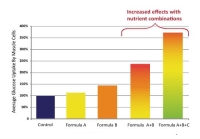Micronutrients Support Healthy Blood Sugar Levels
Diabetes is the one of the fastest growing non-communicable diseases worldwide. It is associated with high blood sugar levels, which increases the risk of cardiovascular disease and kidney problems. It increases one’s risk of serious COVID-19 outcomes, as 40% of people who have died of COVID-19 also had diabetes. Currently, 1 in 11 adults in the world has diabetes, and it is estimated that by 2050 almost 1 in 3 people will have diabetes or pre-diabetes. More than 34 million Americans have diabetes and 7.5 million have pre-diabetes. With such staggering statistics, the National Institutes of Health (NIH) has declared November as Diabetes Awareness Month to prevent and effectively manage this disease.
Diabetes occurs in two forms: type 1 and 2. Type 1 diabetes is caused by insufficient insulin production, and is diagnosed at an early age. Most cases of diabetes afflicting adults are type 2 diabetes, which has been related to poor diet and obesity. Unfortunately, the rate of type 2 diabetes has been increasing in children. This is primarily due to the high consumption of processed foods which contain excessive amounts of sugar. When reading food labels, you may notice “high fructose corn syrup” often disguised under various names. This cheap ingredient is commonly used in many products including breads, cereals, snacks, lunch meats, and soft drinks. It has been shown that as little as four weeks of a moderate fructose diet can increase blood cholesterol and glucose levels. Fructose can induce metabolic syndrome characterized by insulin resistance, coronary artery disease, oxidative stress and inflammation. There are those who benefit from diabetes, including the pharmaceutical companies, which in the US alone have reached almost $50 billion in annual diabetes drug sales. Following conventional drug-based approaches will not change the situation and allow only for a mechanical control of blood sugar without addressing the root cause of this problem.
At the Dr. Rath Research Institute, we compared the effects of a specific micronutrient mixture and a commonly prescribed antidiabetic drug (metformin) on sugar metabolism in young, immature mice.1 All of the mice were fed a high fructose diet with one group receiving the antidiabetic drug metformin, and the other a micronutrient mixture. At the end of seven weeks, the mice in the metformin group exhibited a 15% increase in a marker indicating blood protein damage, while this marker decreased by 4% in mice receiving the micronutrients. Additionally, the metformin group exhibited lower insulin levels indicating poor blood sugar control, while the insulin levels in the micronutrient-supplemented group were restored to normal values. Micronutrient supplementation also resulted in other health benefits, including reduced blood pressure, lower cholesterol, and increased energy.1
Another study conducted at the Dr. Rath Research Institute tested the effects of different dietary supplements on sugar metabolism in muscle cells.2 Three different types of nutritional supplements were used: formula A (containing a comprehensive combination of essential micronutrients including vitamins and minerals and amino acids); formula B (containing only selected micronutrients important for glucose metabolism); and formula C (containing only B group vitamins). We observed that the combination of formulas A, B and C had the maximum effect on glucose uptake by cells, which increased by up to 370% of the control. Better glucose utilization by the cells means more energy for the body. We also evaluated glucose uptake in cells by measuring the activity of a specific enzyme (protein kinase - Akt) facilitating glucose transport. We observed that formulas A and B stimulated this process (called Akt phosphorylation), but the greatest increase -240% - was obtained when formulas A, B and C were combined. This increase indicates a trend towards lower blood sugar levels. This study highlights specific mechanisms by which micronutrients can support healthy glucose metabolism in muscle cells, and it also emphasizes the importance of a synergistic combination of micronutrients.
A healthy diet and lifestyle are always critical. During Diabetes Awareness Month it is also important to consider the addition of well-researched micronutrient supplementation.
Ref:
1. J. Cha, et al., Molecular Medicine Reports, 2011
2. M. Chatterjee et al., J Cell Med Nat Hlth, May 2019.
